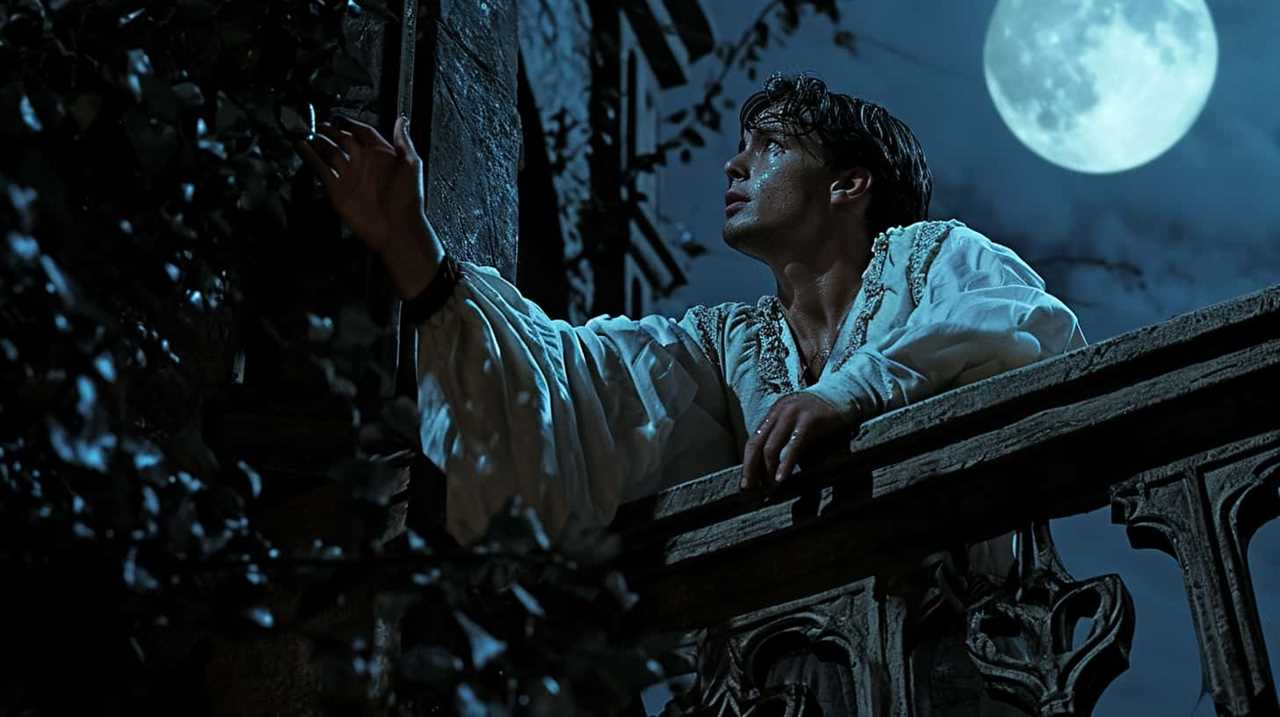Are you ready to experience heartbreak? Get ready to be taken back to a time when emotions ran high and passion was the driving force behind every performance.
In this collection of classic theater monologues, we bring you nine powerful performances that will leave you breathless. From Romeo’s heartfelt plea to Juliet, to Blanche’s desperate confession in A Streetcar Named Desire, each monologue showcases the raw talent and innovation of the actors of yesteryears.
Feel the anguish of Hamlet as he mourns his father’s death, and the haunting words of Medea as she speaks of betrayal. These monologues, delivered with conviction, will touch your soul and leave you contemplating the depths of human emotion.
Get ready to be shattered.

Key Takeaways
- Forbidden love and betrayal are central themes in classic theater monologues, showcasing the sacrifices and desperation faced by characters.
- The emotional impact of monologues is profound, as they delve into the depths of human emotion and the consequences of forbidden love, grief, and societal expectations.
- Symbolism and themes in these monologues highlight shattered dreams, the complexities of relationships, the destructive power of mental illness, and the importance of family honor and love.
- The consequences and effects of the characters’ actions are explored, emphasizing the sacrifices love demands, vulnerability to betrayal and isolation, the consequences of unresolved grief and revenge, and the need to question societal norms and embrace personal agency.
Romeo’s Heartbreaking Plea to Juliet
Prepare to have your heart shattered as Romeo passionately pleads to Juliet, begging her to defy their families’ feuds and choose love over blood. In this iconic scene from Shakespeare’s Romeo and Juliet, we witness the intensity of love and the tragedy of forbidden love and sacrifice.
Romeo’s plea for Juliet is a powerful depiction of the lengths one would go to for love. In his words, we see a desperate desire to break free from the constraints of societal expectations, to transcend the boundaries set by their feuding families. The intensity of his love for Juliet is palpable, as he implores her to forsake her name and her family in favor of their love.
The tragedy of forbidden love is a recurring theme throughout literature, and Romeo and Juliet epitomizes this notion. Their love is forbidden not only by their families but also by the circumstances in which they find themselves. The star-crossed lovers are caught in a web of fate and circumstance, unable to escape the tragic outcome that awaits them.
Sacrifice is another central element in Romeo’s plea to Juliet. He’s willing to sacrifice everything, including his own life, for their love. His words reflect the anguish and desperation of a love that can’t be fulfilled, highlighting the sacrifices that love sometimes demands.

Blanche’s Desperate Confession in A Streetcar Named Desire
When it comes to Blanche’s desperate confession in A Streetcar Named Desire, it’s impossible to ignore the vulnerability that she displays.
Blanche’s unraveling throughout the play is a testament to the weight of her broken dreams and the toll it takes on her mental state.
Symbolically, her confession serves as a window into the shattered illusions she’s been desperately clinging to, ultimately leading to her heartbreaking downfall.
Character Analysis: Blanche’s Vulnerability
Examine Blanche’s vulnerability as she desperately confesses her deepest secrets in A Streetcar Named Desire. Blanche’s vulnerability has a profound impact on her relationships and reveals her psychological fragility. Here are three key aspects to consider:

- Emotional Struggles: Blanche’s desperate confession showcases her emotional turmoil and the depth of her pain. Her vulnerability allows the audience to empathize with her, making her character relatable and human.
- Fragile Self-Image: Blanche’s vulnerability exposes her fragile self-image, as she constantly seeks validation and hides her true self. Her need for acceptance often leads to destructive behaviors and strained relationships.
- Betrayal and Isolation: Blanche’s vulnerability leaves her susceptible to betrayal and isolation. Her secrets, once revealed, drive those closest to her away, leaving her feeling abandoned and alone.
Blanche’s vulnerability not only adds complexity to her character but also highlights the universal struggle of trying to navigate the complexities of human emotions and relationships.
Symbolism of Broken Dreams
In this heart-wrenching monologue, Blanche’s desperate confession in A Streetcar Named Desire serves as a poignant symbol of shattered dreams. Through her words, Tennessee Williams explores the symbolism in shattered dreams and the profound impact they’ve on the lives of characters.
Blanche’s confession reveals her deep longing for a life filled with love, happiness, and security, but her dreams crumble under the weight of her past mistakes and the harsh realities of her present circumstances. Her desperate plea for understanding and forgiveness reflects the universal human experience of broken dreams and the devastating consequences they can have on one’s sense of self.
Blanche’s confession stands as a powerful reminder of the fragility of our aspirations and the profound effect they can have on our lives when they remain unfulfilled.

Hamlet’s Anguish Over His Father’s Death
Hamlet’s grief over his father’s death consumes him, leading him down a path of torment and vengeance. The profound anguish he experiences shapes his entire existence, driving him to question the very fabric of reality. As he grapples with his father’s murder and the subsequent revelation of his uncle’s treachery, Hamlet finds himself trapped in a revenge dilemma that threatens to consume his soul.
The weight of betrayal: Hamlet’s anguish stems from the deep betrayal he feels at the hands of those closest to him. The murder of his father by his own uncle shatters his trust in familial bonds, leaving him questioning the very essence of love and loyalty.
The descent into madness: Hamlet’s grief manifests in his spiraling descent into madness, mirroring the unraveling of his mind. His erratic behavior and cryptic soliloquies reflect the inner turmoil he experiences as he struggles to grapple with his father’s death and the weight of his revenge dilemma.
The tragedy of Ophelia: As Hamlet’s anguish intensifies, it also engulfs those around him. Ophelia, his beloved, becomes a victim of his despair, as her heartbreak over his erratic behavior leads to her own descent into madness. Their intertwined fates serve as a haunting reminder of the destructive power of grief and revenge.

Hamlet’s anguish over his father’s death is a testament to the profound emotional depth of Shakespeare’s tragedy. It serves as a poignant exploration of the human psyche and the devastating consequences of unresolved grief and vengeance.
Ophelia’s Tragic Monologue in Hamlet
During Ophelia’s tragic monologue in Hamlet, you’re transported into the depths of her despair as she laments the loss of her sanity and the shattered dreams of her love. Ophelia’s monologue is a powerful portrayal of her struggle with identity and the devastating effects of Hamlet’s mental deterioration on their relationship.
As Ophelia mourns the loss of her father and Hamlet’s descent into madness, she grapples with her own sense of self. She questions her worth and sanity, feeling trapped between societal expectations and her love for Hamlet. Ophelia’s struggle with identity is further intensified by her inability to comprehend Hamlet’s erratic behavior, leaving her confused and heartbroken.
Hamlet’s mental deterioration plays a pivotal role in Ophelia’s tragic monologue. His erratic actions and cruel words towards her fracture their once loving relationship, leaving Ophelia emotionally shattered. She mourns the loss of the man she once knew, unable to reconcile the reality of his madness with the dreams she once had for their future together.

In this powerful monologue, Ophelia’s words reveal the devastating impact of Hamlet’s mental deterioration on both their lives. Through her heartfelt lamentations, we witness the unraveling of her sanity and the crushing weight of shattered dreams. Ophelia’s tragic monologue serves as a poignant reminder of the destructive power of mental illness and the tragic consequences it can have on those caught in its grip.
Willy Loman’s Heartbreaking Revelation in Death of a Salesman
- Experience the gut-wrenching impact of Willy Loman’s heartbreaking revelation in Death of a Salesman as you witness the unraveling of a man’s dreams and the crushing weight of his shattered hopes.
This iconic play by Arthur Miller delves into the disillusionment of Willy Loman, a middle-aged salesman who’s haunted by the disparity between his aspirations and his reality. As the audience, you’re drawn into Willy’s world and intimately witness his gradual descent into despair.
- Willy Loman’s disillusionment: Willy is a man who’s dedicated his life to the pursuit of the American Dream, only to be confronted with the harsh reality that success may forever elude him. His disillusionment stems from the realization that his years of hard work haven’t brought him the prosperity he’d hoped for, leaving him feeling trapped and unfulfilled.
- Romeo and Juliet’s forbidden love: In Death of a Salesman, Willy’s disillusionment can be likened to the tragic love story of Romeo and Juliet. Just as their love is forbidden and ultimately leads to their untimely demise, Willy’s aspirations are forbidden by the harsh realities of the American Dream, leading to the destruction of his own spirit.
- The crushing weight of shattered hopes: Throughout the play, Willy’s shattered hopes become increasingly evident. He’s burdened by the weight of unattainable success, which ultimately leads to his mental and emotional breakdown. The audience is left with a profound sense of sadness and empathy as they witness the heartbreaking revelation of a man whose dreams have been shattered.
Medea’s Haunting Words of Betrayal
Experience the haunting words of betrayal as Medea, a woman scorned, unveils the depths of her anguish and seeks vengeance in the classic play Medea. Medea’s descent into madness is driven by the ultimate act of betrayal – her husband’s abandonment. Medea’s character’s revenge isn’t only fueled by her wounded pride but also by her deep love for her children, whom she sees as the embodiment of her lost happiness. In her soliloquies, Medea expresses her anguish and her determination to make her husband suffer as she’s suffered.
Medea’s haunting words of betrayal resonate with audiences because they tap into our primal fears and desires. We’re captivated by Medea’s raw emotions and her unwavering resolve to exact revenge. Her words reveal the complexity of human nature, exploring themes of love, betrayal, and the depths to which one can sink when consumed by anger and grief.

Medea’s descent into darkness is a cautionary tale, reminding us of the destructive power of revenge. As we watch her plot and execute her plans, we’re forced to confront our own capacity for cruelty and the consequences of our actions. Medea’s words of betrayal reveal the dark side of human nature, leaving us both horrified and fascinated by her tragic journey.
Antigone’s Devastating Defense of Family Honor
Antigone fiercely defends her family honor, revealing the depths of her determination and unwavering loyalty. In Sophocles’ tragedy, Antigone, she finds herself in a moral dilemma that pits her loyalty to her family against her duty to obey the law. As she stands before King Creon, she passionately argues for her right to bury her brother, Polynices, despite the decree forbidding it. Antigone’s devastating defense of family honor showcases her unwavering commitment to her loved ones, even in the face of dire consequences.
- Conflict of Loyalties: Antigone’s moral dilemma arises from conflicting loyalties. On one hand, she feels duty-bound to honor her deceased brother by performing the sacred rites of burial. On the other hand, she’s aware of the repercussions of defying the law set by the ruler, Creon.
- The Power of Family: Antigone’s defense highlights the importance of family honor. She argues that the bonds of kinship transcend societal laws and that denying her brother a proper burial wouldn’t only disrespect him but also bring shame upon her family.
- The Consequences of Defiance: Antigone knows that her actions will have severe consequences, including death. Nevertheless, she stands firm in her beliefs, willing to sacrifice her own life to maintain the integrity of her family.
Antigone’s devastating defense of family honor forces us to question the boundaries between personal loyalty and societal obligation. It challenges us to consider the consequences of defying the law when our moral compass calls us to do otherwise. In her unwavering determination, Antigone embodies the enduring power of familial love and the lengths one would go to protect it.
Nora’s Heart-Wrenching Decision in A Doll’s House
Nora’s heart-wrenching decision in A Doll’s House will leave you on the edge of your seat as she grapples with the repercussions of her daring act. Nora’s dilemma is one that resonates deeply with audiences, as it confronts societal expectations and the consequences of breaking free from them.

In A Doll’s House, Nora Helmer is faced with a difficult decision: to leave her husband and children in order to find her own identity and independence. This decision is not made lightly, but rather after years of feeling trapped in a loveless marriage and stifled by societal norms. Nora’s choice to leave is a bold and courageous one, but it is also one that comes with significant consequences.
The table below illustrates the consequences of Nora’s decision:
| Consequences of Nora’s Decision |
|---|
| Loss of societal standing |
| Abandonment of her children |
| Potential financial instability |
Nora’s decision to leave her husband and children results in a loss of societal standing, as she is seen as abandoning her duties as a wife and mother. This loss of reputation can have far-reaching effects on her personal and professional life. Additionally, Nora’s decision means she must leave her children behind, causing emotional turmoil for both her and her family. Lastly, there is also the potential for financial instability as Nora must navigate life on her own without the support of her husband.
Nora’s heart-wrenching decision in A Doll’s House forces us to question the expectations placed upon individuals and the sacrifices they make for their own happiness. It challenges us to consider the consequences of breaking free from societal norms and the price one must pay for personal freedom. Nora’s story is a timeless reminder of the complexities of human relationships and the power of individual agency.

Amanda’s Despair in The Glass Menagerie
In The Glass Menagerie, you’ll witness Amanda’s overwhelming despair as she grapples with the hardships of her family’s circumstances. Amanda’s regrets and longing are palpable throughout the play, as she desperately clings to memories of her past and the hope of a better future.
- Amanda’s Regrets: Amanda is haunted by the choices she made in her youth. She constantly reminisces about her days as a Southern belle and laments the loss of her gentleman callers. Her regrets stem from the fear that she’s failed to secure a prosperous future for her children, particularly her daughter Laura, who’s physically and emotionally fragile.
- Amanda’s Longing: Amanda’s longing is twofold. Firstly, she yearns for the stability and security she believes her children should have. She longs for Laura to find a suitable husband to take care of her, and for her son Tom to abandon his dreams and settle down. Secondly, Amanda longs for the life she once had, filled with excitement and admiration. Her longing for the past fuels her actions, as she seeks to recreate a world that no longer exists.
- Amanda’s Despair: Despite her efforts, Amanda’s despair grows as she realizes the futility of her dreams. She’s trapped in a world of nostalgia and fantasy, where her desires remain unfulfilled. Her despair is further amplified by the realization that she’s become a burden to her children, rather than a source of support.
In The Glass Menagerie, Amanda’s regrets and longing intertwine, creating a poignant portrayal of a mother’s desperate struggle to find happiness for herself and her children. Her overwhelming despair serves as a reminder of the fragility of dreams and the harsh realities of life.
Frequently Asked Questions
What Is the Historical Context of Romeo’s Heartbreaking Plea to Juliet?
In Romeo’s heartbreaking plea to Juliet, the historical influences and cultural significance are evident. The context of their forbidden love and feuding families adds depth and intensity to their tragic story.
How Does Blanche’s Desperate Confession in a Streetcar Named Desire Reflect the Societal Pressures of the Time?
Blanche’s desperate confession in "A Streetcar Named Desire" reflects the societal pressures of the time by exposing her vulnerability and the crushing weight of societal expectations. She reveals the struggle of conforming to societal norms while yearning for personal freedom.

What Are Some Other Examples of Shakespearean Monologues That Showcase Hamlet’s Anguish Over His Father’s Death?
Are you searching for Shakespearean monologues that capture Hamlet’s deep anguish over his father’s death? Look no further. These powerful soliloquies will pierce your heart and leave you in awe.
How Does Ophelia’s Tragic Monologue in Hamlet Contribute to the Overall Theme of Madness in the Play?
Ophelia’s monologue in Hamlet showcases the portrayal of madness, contributing to the overall theme. By exploring her descent into madness, the monologue offers insight into the destructive consequences of societal expectations and the power of grief.
What Are Some Other Powerful Monologues in Death of a Salesman That Explore Willy Loman’s Heartbreaking Revelation?
In Death of a Salesman, Willy Loman’s emotional breakdown reveals the devastating consequences of societal expectations. Through his monologues, we witness the tragic unraveling of a man who can no longer keep up with the demands of a merciless world.
Can You Provide a List of Classic Theater Monologues that are Known for Shattering Hearts?
Looking for classic theater heartbreaking monologues that will shatter hearts? Look no further. Some iconic monologues include Juliet’s balcony speech from “Romeo and Juliet,” Blanche’s emotional breakdown in “A Streetcar Named Desire,” and Hamlet’s introspective soliloquy. These powerful performances are sure to leave a lasting impact.
Conclusion
As you journey through these classic theater monologues, your heart will undoubtedly be shattered by the raw emotions and devastating revelations of the characters.

Each monologue offers a glimpse into the depths of human experience, exploring themes of love, loss, betrayal, and the complexities of family dynamics.
Through the power of coincidence, these timeless pieces of literature resonate with us, reminding us of our own vulnerabilities and the universal struggles we all face in life.









